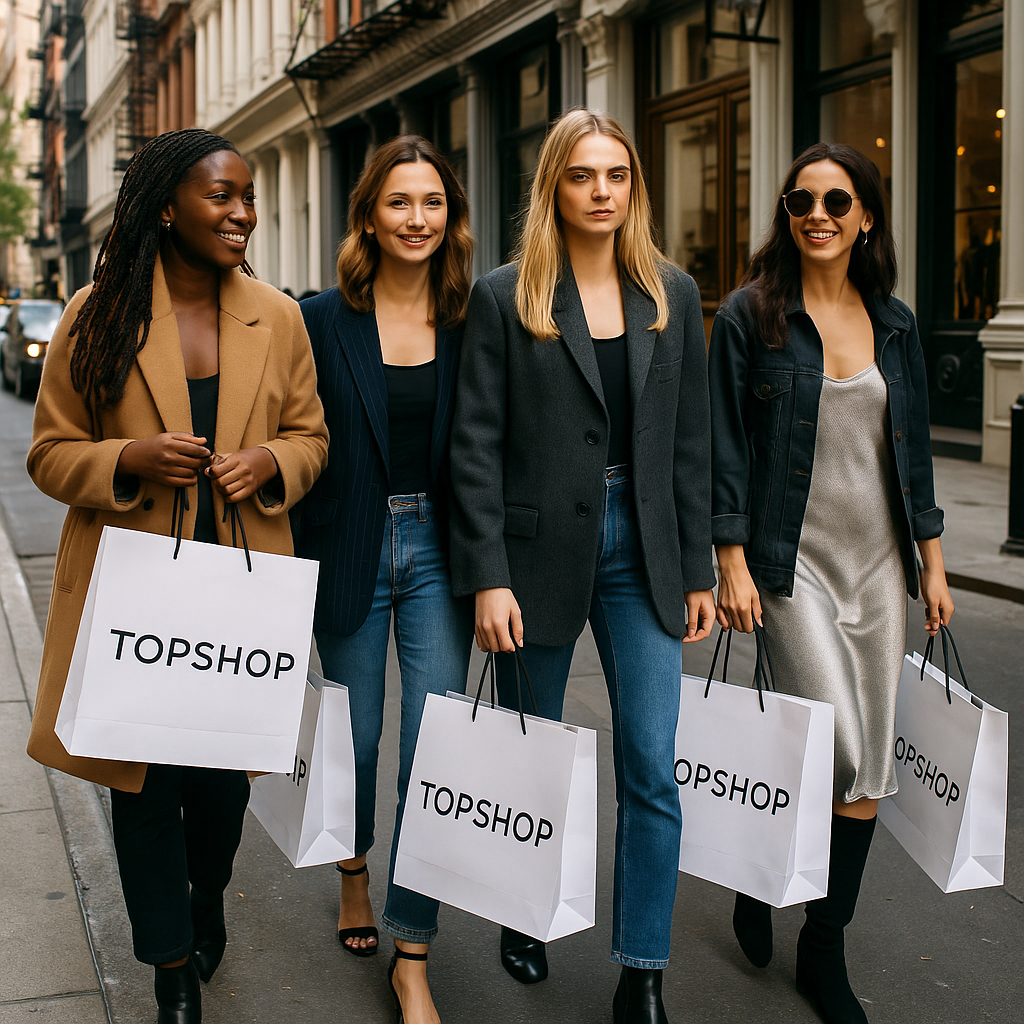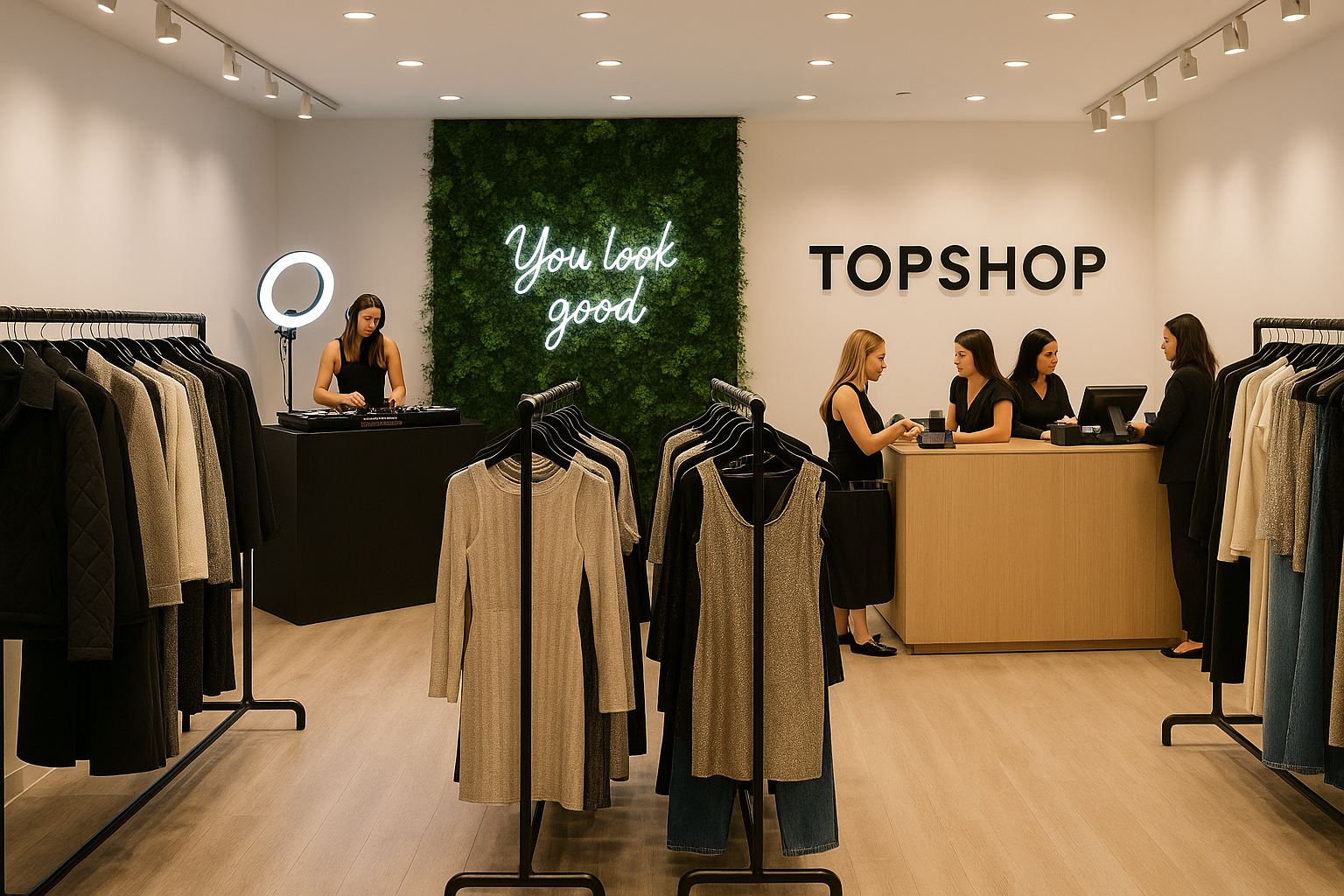CONCEPT CASE STUDY
Topshop’s Reboot Playbook, From Nostalgia to Next-Gen Strategy

Topshop was once the crown jewel of fast fashion, a brand that drew teens and young adults into the Oxford Street flagship in London like moths to a flame. But low-quality products and the rise of competitors chipped away at its reputation until it shuttered physical stores. Now, in 2025, Topshop is back: relaunching online, reclaiming cultural relevance, and setting the stage for a slower, more strategic comeback.
Here’s what their reboot teaches us about brand storytelling, digital-first launches, and how events can create momentum long after opening night.
-
One of Topshop’s most telling pivots is its acknowledgement of customer feedback. Fans loved the brand’s style and accessibility, but quality was often the Achilles’ heel. The new positioning, targeting 18 to 40-year-olds with longer-lasting, higher-quality pieces, speaks directly to those past frustrations.
Instead of chasing the lowest price point, Topshop is leaning into durability, value, and style evolution that matures with its audience.
Takeaway: Legacy brands can regain trust when they address, rather than ignure, past critiques.
-
Unlike rapid-fire drops during its heyday, the 2025 reboot is rolling out in stages:
Relaunch of Topshop.com before wholesale expansion
Collaborations staggered throughout fall (a contemporary artist collab for Topman, an emerging designer collab coming soon)
Sponsorship of the Elle Style Awards to reinforce cultural credibility
This slower pace keeps anticipation high without overwhelming audiences. It also aligns with the broader cultural shift toward mindful consumption.
Takeaway: Excitement builds when awareness, storytelling, and shopping opportunity are aligned, not rushed.
-
Partnerships and collaborations are central to Topshop’s new DNA:
Cara Delevigne reconnects with former fans through nostalgia
Artist and designer collabs keep the brand plugged into cultural events
Elle Style Awards sponsorship positions Topshop within high-fashion spaces it once struggled to claim
Takeaway: True collaborations is about attaching your brand to moments and communities your audience values.
Case study extension…
A Hypothetical NYC Pop-Up During NYFW
To keep momentum, Topshop could turn NYFW into its U.S. splash moment. A pop-up shop in SoHo or the Meatpacking District would blend retail, experience, and digital buzz.
Digital-first RSVP Strategy
Shoppers book time-blocked RSVPs online to prevent long lines and gather first-party data
Pre-event content includes:
Staff sharing behind-the-scenes buildout of the retail space
Influencers reminiscing about the Topshop days and showing off old pieces
Sneak peeks of what will be on sale
Experiential Elements
A DJ and curated playlist (available on Spotify afterward)
A photo booth with Topshop’s new campaign branding
Partnerships with trendy food and beverage brands (think canned cocktails or alt-coffee bars)
Exclusive on-site merch drops
Signature shopping bags: With Topshop not currently shipping to the U.S., the pop-up shop becomes an exclusive way to shop the brand. Branded bags double as walking billboards, turning every customer into an ambassador on the streets of NYC during fashion week.
Amplification Strategy
Encourage attendees to share their RSVP confirmations and time slots on social media (“See you at Topshop @ 2 PM Saturday”)
Capture influencer content live to fuel Topshop’s own digital channels
Use TikTok and Instagram to recap each day of the pop-up, ensuring the event lives on well beyond the final guest
Topshop has officially entered its reinvention era. By listening to customer feedback, embracing slower rollouts, and fueling momentum with collaborations and events, the brand is rewriting its own playbook. For agencies and marketers, the lesson is clear: legacy isn’t enough. To truly relaunch, you have to rebuild trust, design for culture, and create digital-first experiences that extend the story far beyond the room.
Source: From London to the world: Inside the Topshop reboot, Vogue Business


